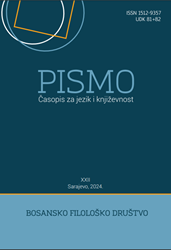Posttraumatski stresni poremećaj i narativizacija ratnog iskustva u romanu William Shakespeare u Dar es Salaamu
Post-Traumatic Stress Disorder and the Narrativization of War Experience in the Novel William Shakespeare u Dar Es Salaamu
Author(s): Amina BulićSubject(s): Bosnian Literature, Theory of Literature, Sociology of Literature
Published by: Bosansko filološko društvo
Keywords: PTSD; trauma; identity; memory; William Shakespeare u Dar es Salaamu; Irfan Horozović;
Summary/Abstract: Post-traumatic stress disorder (PTSD) is caused by the “misencoding” of a traumatic event in memory. Irfan Horozović’s novel William Shakespeare u Dar es Salaamu places the former war camp survivor, Ejub, at the center of the story, both thematically and motif-wise, through his repeated confrontations with PTSD. In this paper, we analyze the ways in which the individual experience of war is narrated, which, from the perspective of the PTSD of the central character, “refuses to be articulated.” By questioning phenomena closely related to PTSD and its development—such as trauma, memory, identity, exile, and testimony—we highlight the specificities of Horozović’s approach to story composition, the construction of the characterʼs identity, the narrativeʼs identity, and the novel’s ethical dimensions. Through the analysis of the genre diversity of the narrative from the standpoint of the war counternarrative, we will explore its potential for de-stigmatizing PTSD within Bosnian literary discourse.
Journal: Pismo - Časopis za jezik i književnost
- Issue Year: 2024
- Issue No: 22
- Page Range: 157-188
- Page Count: 32
- Language: Bosnian

